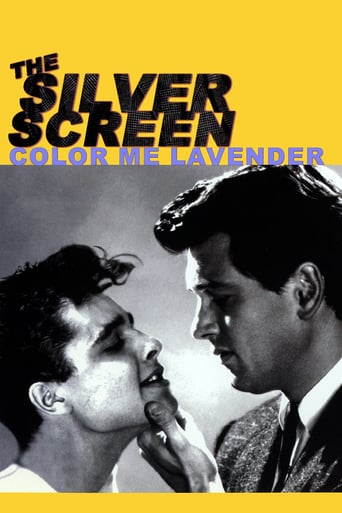rbrtptrck
This delightful prank merely examines and speculatively questions and VERY tentatively explains certain relationships and gags which it CLEARLY demonstrates occur in movie after movie from the Golden Age of Film. Unlike "The Celluloid Closet," which was an historical piece showing depictions of gays in movies, this one explores more the hinty, suggestive patterns which any gay kid noticed for himself - the half-admitted shrieking gayness of certain comedians, the sly (and frequent) "you'd almost think we were gay" humor of certain comic male duos, and the seething repressed homoeroticism of the classic westerns. It's something to relax and enjoy and maybe ponder. I, for instance, have always wondered why, in the most inappropriate situations, our action-stars strip down (isn't Rambo afraid of bugs and thorns going bareshirted in a jungle?). Gratuitous male nudity in movies intended primarily for male audiences does provoke thought - among other things.
groggo
Director Mark Rappaport, abetted by smug-perfect actor-narrator Dan Butler ('Frasier'), presents a myriad of film clips from a myriad of films, and manages to find 'hidden gayness' in every one of them. The whole film is reminiscent of social scientists who stubbornly hold to certain theories, and, using questionable methods, painstakingly set out to prove them. This flick tells us that those 'buddy' movies (Hope-Crosby, Martin-Lewis et al) were reflections of repressed homosexuality. Heterosexual affection between men is a myth: they're all hiding something. The Walter Brennan Syndrome, as Rappaport preciously and pretentiously calls it, is really the story of those many trusted movie 'sidekicks' who secretly harbour homoerotic fantasies about their heroes. This extends to great cinematic 'sidekicks' like Brennan, Millard Mitchell, Andy Devine, Walter Huston and many others. This is amazing arrogance, and it's stitched together here in an effort to imitate an actual documentary. If you follow the relentless drumbeat of the Rappaport-Butler conspiracy theory, huge numbers of screenwriters and directors are or were gay, closeted or no. Why? Because they reveal themselves in their dialogue. Those double entendres and nuances are nothing more than confirmation of secreted homosexuality. Case closed. Alas, human discourse, developed over many thousands of years, is just slightly more complicated than that. This flick deliberately tries to be sensational, and fails miserably. There is very little sensationalism to be found, unless you think 'outing' Rock Hudson, Randolph Scott and Sal Mineo is sensational. Those guys were 'outed' decades ago.If you're looking for a truly stupid and boring fake documentary, this is for you. And it's smug; oh, is it smug. Insufferably, intolerably smug.
Citymars
Practically unwatchable documentary that best serves to make one appreciate the talent behind "The Celluloid Closet." The narrator/host (Dan Butler) is first seen inserted into a movie still, a device that grows quickly tiresome. Then he talks. And talks. And talks. The stunning amount of narration swamps whatever pleasure one might have in watching the film clips, a few of which would otherwise have merit.Furthermore, the filmmaker goes to ridiculous lengths to promote his "spot the closet case" premise: Rappaport (also the director and writer of the vastly overrated "Rock Hudson's Home Movies") seems to believe that any display of love or affection between men is "gay."


